
Table of Content
Focus on what matters. BIXO handles the rest!

Product management is not only about ideas and collaboration, but also about having the right tools to turn those ideas into action. As a product manager, you deal with planning, feedback, meetings, and constant updates daily. But, AI tools can make your work easier by saving time, improving decisions, and keeping everything on track.
With so many tools out there, it’s not always easy to figure out which ones actually make your job easier. In this blog, you’ll get to know the top 10 AI tools for product managers that can help you work smarter, stay organised, and guide your team with more confidence.
What Are the 10 Best AI Tools for Product Managers?
AI is changing how product managers work by making everyday tasks faster and smarter. Whether it’s planning, analysing data, or staying organised, these tools can make your job a lot easier. Here are the 10 best AI tools for product managers to explore.
1. BIXO
BIXO is an AI-powered task manager that helps teams stay organised and on the same page. It takes care of follow-ups, keeps track of tasks, and makes sure nothing is missed. For product managers, BIXO makes it easy to stay updated on what the team is working on and quickly check the progress of tasks across projects.
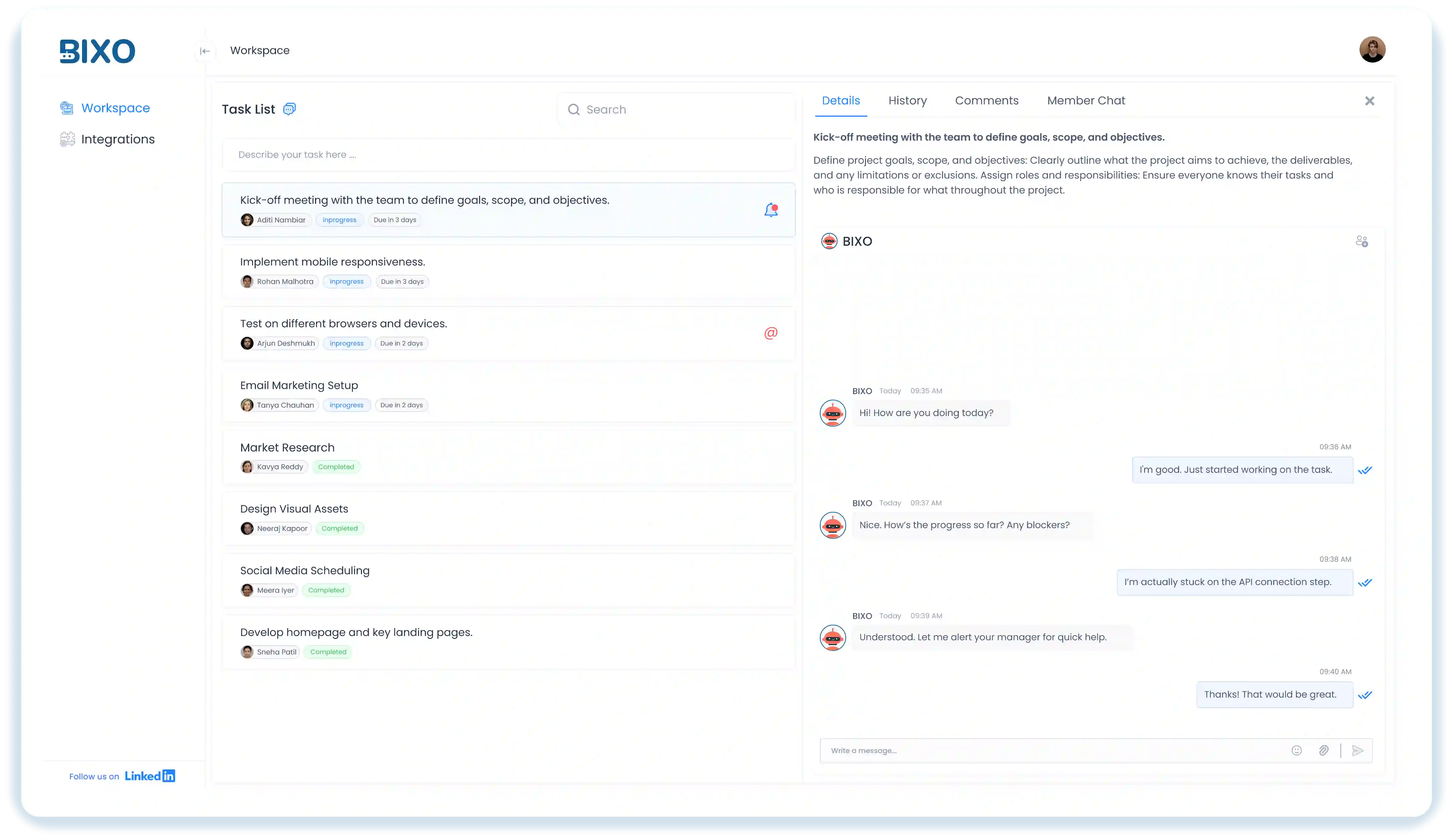
Key Features:
- Keeps track of tasks automatically
- Sends follow-ups so nothing is forgotten
- Shows what the team is working on
- Makes it easy to see progress across projects
- Helps product managers stay organised without extra effort
Best for: Smarter task planning and Team Management
2. ChatGPT / Google Gemini
ChatGPT and Google Gemini are AI tools that can read, write, and summarise text. They can help create ideas, write drafts, and explain information clearly. For product managers, these tools can quickly make product briefs, come up with new feature ideas, and summarise research or meeting notes, saving time and keeping work organised.

Key Features:
- Generates text and ideas quickly
- Summarises documents and notes
- Helps with writing and generating ideas
- Creates drafts for emails, briefs, or reports
- Turns complex information into simple, clear text
Best for: Quick idea generation and clear content creation
3. Notion AI
Notion AI is an AI assistant built into the Notion workspace that can help create, summarise, and organise notes and documents. It can draft content, simplify information, and keep everything easy to find. For product managers, it can quickly summarise meeting notes, create documents, organise project details, and keep team information in one place, saving time and reducing confusion.
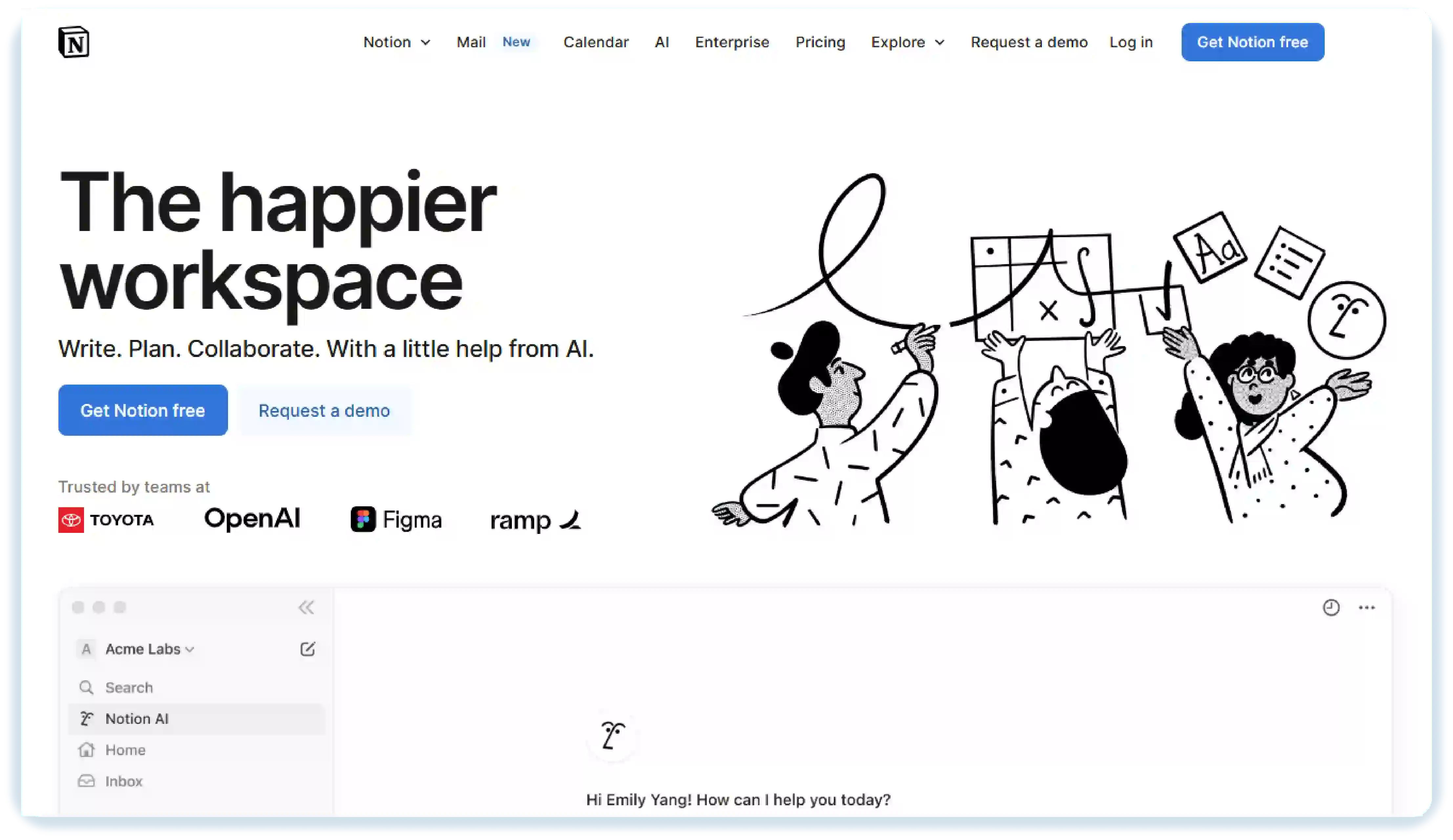
Key Features:
- Turns meeting notes into simple summaries
- Helps write documents and reports quickly
- Keeps notes and information organised
- Makes teamwork easier and clearer
- Stores and find project details easily
Best for: Writing, summarising, and keeping everything neatly organised
4. Productboard
Productboard is a product management tool that helps teams decide what to build next and why. It collects feedback from customers, tracks feature requests and helps product managers decide which features to build first and plan roadmaps. With a clear roadmap, teams can stay focused on work that matters and make sure every feature adds real value to users.

Key Features:
- Collects and organises customer feedback easily
- Prioritises features based on real needs
- Creates clear product roadmaps for your team
- Aligns everyone on what to build next
- Makes smarter product decisions with insights
Best for: Feature prioritisation and roadmap clarity
5. Miro
Miro is a digital whiteboard tool that helps teams share ideas, plan projects, and work together visually. It allows teams to create visual plans, outline workflows, and gather feedback in one place. Managers use Miro to plan product timelines, share ideas, and keep everyone connected, even when working from different locations.

Key Features:
- Brings your team together in one shared space
- Plans ideas and workflows visually
- Conducts online idea-sharing sessions with ease
- Works together smoothly, no matter where everyone is
- Turns team ideas into clear, actionable plans
Best for: Visual collaboration and idea sharing
6. Amplitude
Amplitude is a product analytics tool that helps teams understand how users interact with their product. It tracks user activity, highlights trends, and provides useful insights for better decision-making. Amplitude helps managers analyse which features are performing well, where users face issues, and what changes can make the product more effective.

Key Features:
- Tracks and analyses user behaviour in detail
- Identifies trends and usage patterns clearly
- Helps product managers make informed decisions
- Provides easy-to-read reports and dashboards
- Supports data-driven improvements and growth
Best for: User insights and smarter decisions
7. Asana
Asana is a project management tool that helps teams stay organised, track progress, and complete tasks on time. It lets teams set goals, assign work, and monitor deadlines all in one place. Asana makes it easier to plan projects, manage timelines, and keep everyone on the same page, ensuring smooth teamwork from start to finish.

Key Features:
- Helps teams plan and manage projects smoothly
- Makes it easy to share updates and track progress
- Keeps tasks, goals, and deadlines clear for everyone
- Brings teams together to work in sync
- Reduces confusion and keeps work well organised
Best for: Project planning and deadline tracking
8. Zeda.io
Zeda.io is an AI-powered product management tool that helps teams collect, understand, and act on customer feedback. It turns feedback from different sources into clear insights, making it easier to decide which features to build next. It helps managers connect customer needs with business goals and keeps the product roadmap focused on real user value.

Key Features:
- Gather feedback from multiple sources in one place
- Turns user input into useful insights
- Helps prioritise product features based on real needs
- Keeps teams aligned with clear product goals
- Supports smarter, customer-driven decisions
Best for: Customer feedback and product improvement
9. Figma
Figma is a simple online design tool that helps teams create, test, and share their designs in one place. It helps designers work together on layouts and prototypes in one shared space. For managers, it helps review designs faster, share input clearly, and keep the team working in sync.

Key Features:
- Create and edit designs together in real time
- Turn ideas into working design prototypes
- Keep all design files and feedback in one place
- Improve teamwork between design and product teams
- Reduce back-and-forth by centralising collaboration
Best for: Design, prototypes, and creative teamwork
10. ClickUp
ClickUp is a work management tool that brings all your tasks, projects, and team goals into one place. It helps teams plan, track, and manage everything from daily to-dos to long-term projects. For product managers, ClickUp makes it easier to set priorities, monitor progress, and keep everyone focused on shared goals without jumping between multiple tools.
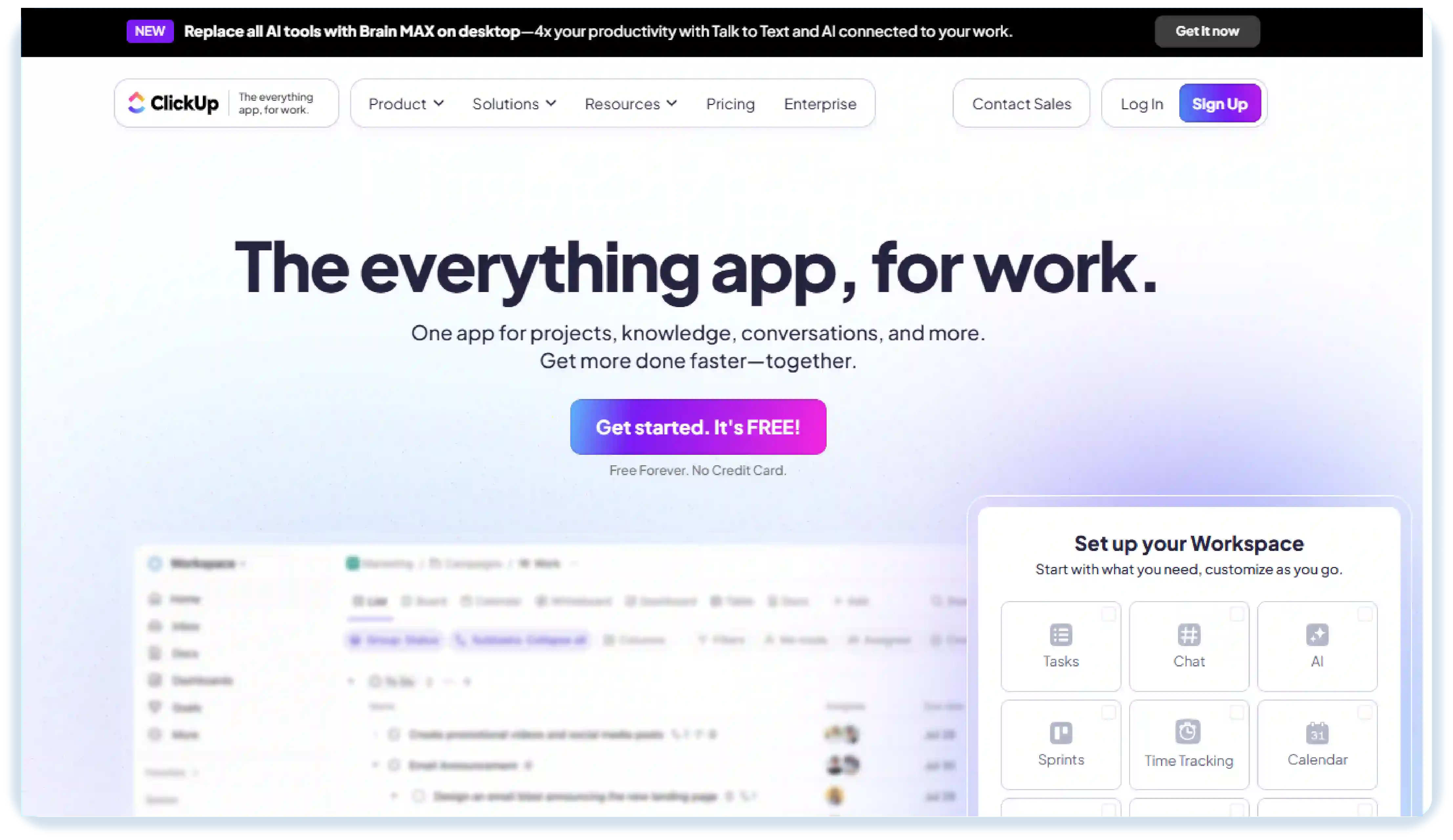
Key Features:
- Brings all tasks and projects together in one place
- Makes it easy to see what’s done and what’s next
- Helps the team focus on what matters most
- Keeps everyone on the same page
- Reduces back-and-forth between different tools
Best for: All-in-one work and task management
Conclusion
Managing projects can be tricky, but AI tools make it easier for product managers. They help keep tasks organised, track progress, and make sense of team updates. BIXO goes a step further by keeping an eye on tasks, sending follow-ups, and giving a clear picture of what everyone is working on. Using tools like these helps teams stay on track, saves time, so managers can focus on making better decisions.
FAQs
Yes, many of these tools, like BIXO, Notion AI, and ClickUp, are great for small teams because they’re simple to use, affordable, and help manage multiple projects without extra effort.
Yes. By removing manual work and reducing confusion, AI tools let teams focus on meaningful tasks. This keeps productivity high and helps everyone feel more in control and organised.
Not at all. Most modern AI tools are built with simple interfaces and quick onboarding guides. Even first-time users can start managing projects efficiently within a few days.
Unlike most tools, BIXO focuses on automation and follow-ups. It helps product managers stay updated on tasks without needing to constantly check in with the team.
Get a demo of BIXO
Recommended Blogs

How to Delegate Tasks Effectively: 7 Tips for Managers
Learn how to delegate tasks effectively, save time, and boost team productivity with step-by-step tips, real examples, and smart AI tools.
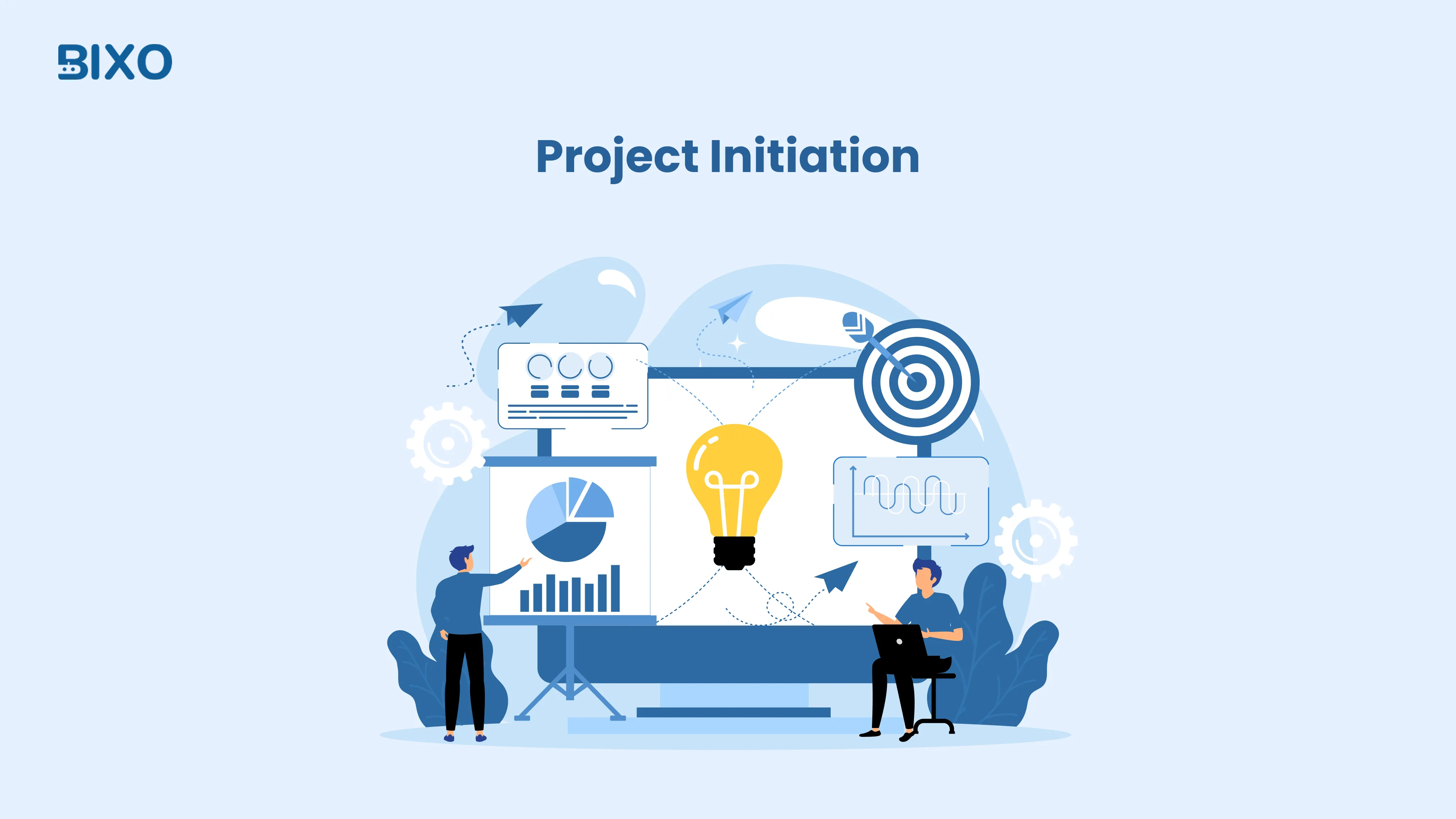
Project Initiation: Key Steps, Best Practices, & Mistakes to Avoid
Learn what project initiation is, why it matters, key steps to follow, best practices to apply, and mistakes to avoid for a strong and successful project start.
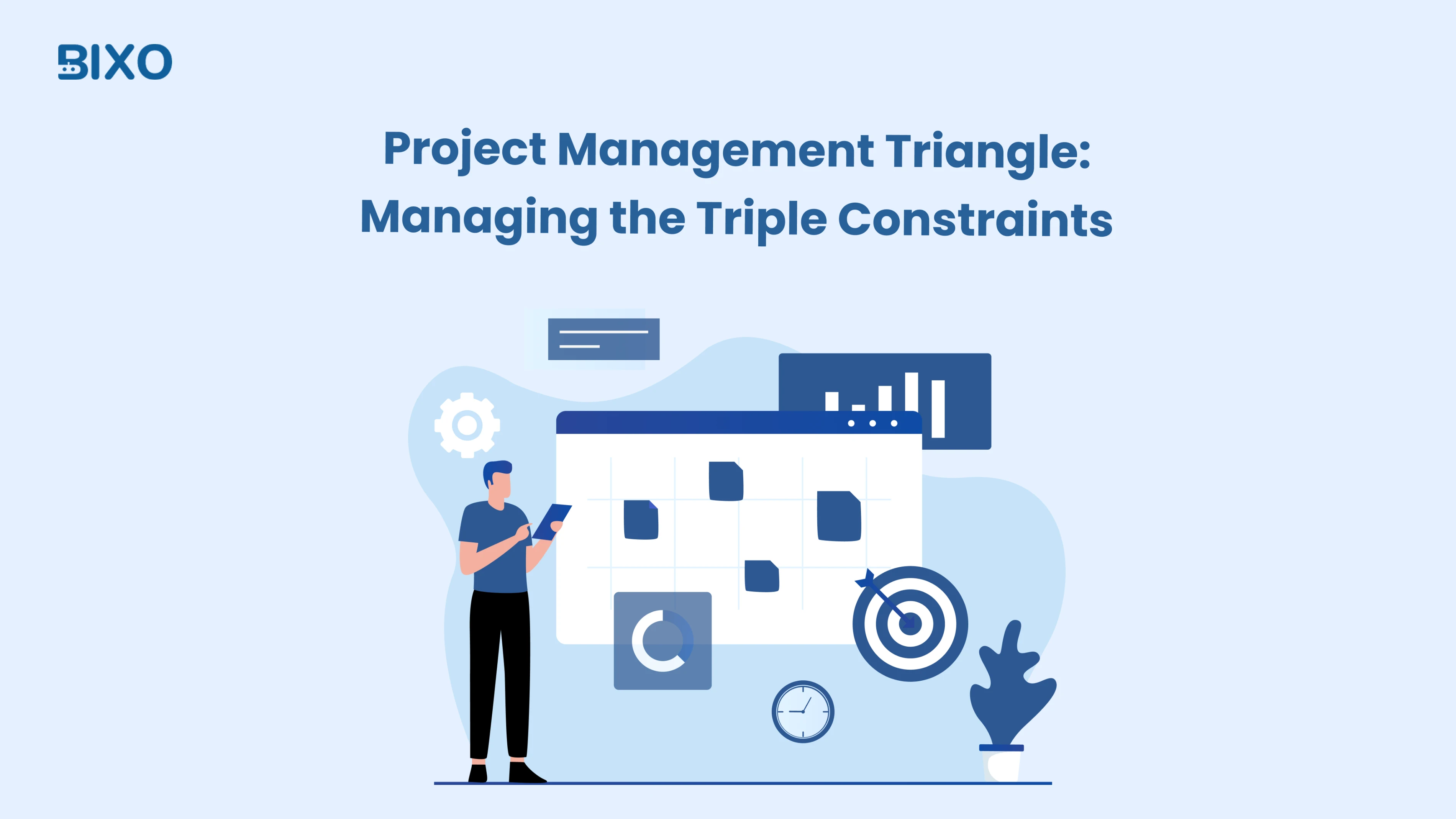
Project Management Triangle: Managing the Triple Constraints
Master the project management triangle by balancing scope, cost, and time with simple strategies that drive successful outcomes every time.
 Jahnavi Chintakrindhi |
Jahnavi Chintakrindhi |
 Oct 13, 2025
Oct 13, 2025
